When you think about exotic pets, your mind doesn’t immediately go to guinea pigs or cat breeds that are part wild cat. Instead, we often think of colorful reptiles, pet skunks, and non-domesticated foxes, hoping that one of these animals is dog-like enough to be a legal pet. Although technically exotic, we’ve listed some of the more social animals and low-maintenance exotic pets below to give you an idea of what’s available.
Large Exotic Pets
These pets are better suited for outdoor enclosures or they’re considered to be extremely high maintenance due to their size and needs. A large enclosure will be needed for these pets, but they may not need to be house-trained, depending on the kind of pet you buy. For example, many exotic cats require more space than other domesticated cat breeds because they grow larger and are highly intelligent. Exotic cats don’t require an “enclosure”, but you may wish to put an escape-proof fence around your garden.
For the purposes of this section, we’ll consider anything bigger than a standard Domestic Shorthair cat to be a “large” exotic pet.
Bengal Cat
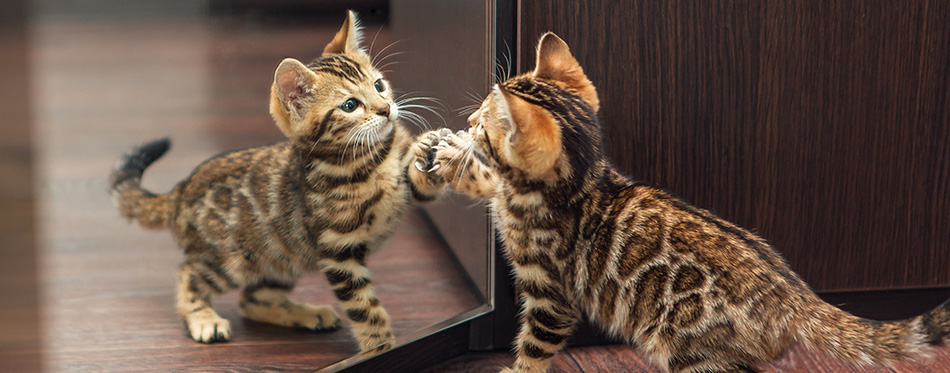
Though they’re beautifully exotic to look at, there are restrictions on states where owning a Bengal cat is allowed.
The concern with Bengal cats is that they are often considered half-wild still, but this is incorrect. While the first generation of Bengal cats were, the generations after that are not. This is because the first generation was the direct result of breeding a domestic cat and an Asian Leopard Cat. Since then, breeders have continued to breed Bengals with domestic cats, further reducing their “wild side”.
In the U.S., this breed is banned in Connecticut, Hawaii, Seattle, and New York. There are restrictions or requirements in Alaska, Delaware, Denver, Georgia, Iowa, and Massachusetts – one such requirement may be the generation of the cat.
Later generations of Bengal cat can be territorial but they’re also very social animals and will be happy to be around their owner once they’ve settled into their home. When looking to buy or adopt a Bengal, we would advise locating an F5 Bengal cat because they’re the most widely accepted in states with restrictions.
Basic care needs:
- Plenty of exercise and playtime
- An area to swim or play in water
- A leash and harness for walks (Bengals are like dogs and walk well on leashes)
- Professional training in commands and obedience
Savannah Cat
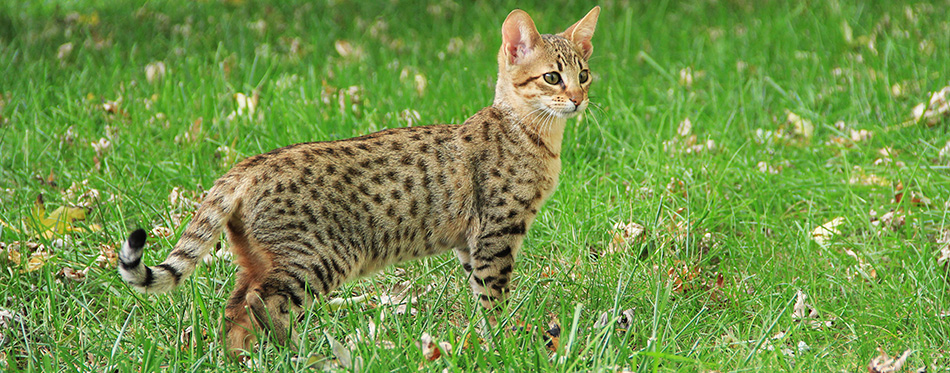
Like Bengals, the Savannah cat was bred from a wild cat and a domestic cat. We wouldn’t recommend going anywhere near a 1st generation Savannah cat if you’re looking for a cute, domestic pet. Stick to Purebred Savannah cats because they have an extremely reduced amount of wild traits and behave more like any other domestic breed of cat. A Purebred Savannah is a kitty that has had at least three previous generations of Savannah cat breeding in their ancestry.
The breed standard of this cat will reveal a domestic kitty with traits of African Servals (the breed’s wild ancestors). The idea of the breed was to produce a domestic cat that had an even temper, yet still looked like the African Serval. Interestingly enough, if the resulting kittens are bred from poorly developed Savannah cats, you can end up with a Savannah that looks like a Bengal.
Savannahs are highly intelligent and extremely curious. They get into all kinds of mischief, so they’ll need pet owners with experience and a willingness to keep up with them. This is not your typical house cat, and they’ll keep you on your toes from a young age.
Basic care needs:
- Friendly atmospheres
- Lots of socialization
- Quality cat food, though a raw meat diet is the most nutritional for them
- Leash training
- Obedience training
- An ample amount of exercise and play
Fennec Foxes
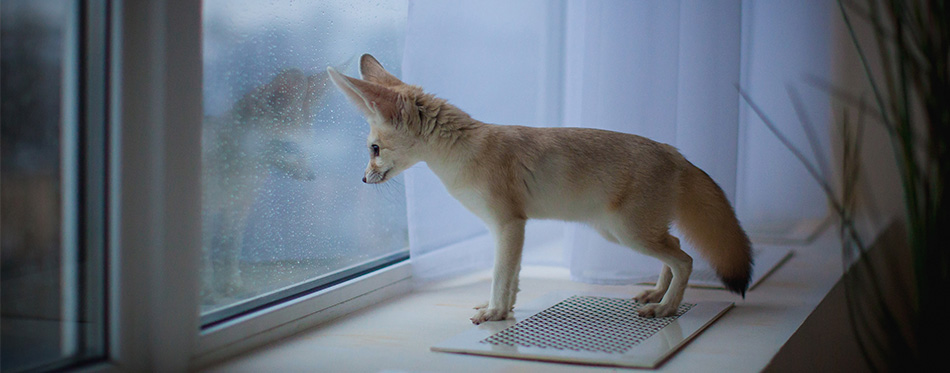
There are domesticated foxes out there in the world, and the Fennec fox is one such breed of fox that can be owned as a pet – provided you have the proper licenses required by your state. A fox may seem like a cool pet to have, but they are extremely messy and smelly, and they require a lot of care. Unlike the two exotic cats we’ve just talked about, foxes do need a full outdoor enclosure and a lot of outdoor space. This is not a pet that you want in your home 24/7.
Foxes are often domesticated when they need to be rescued and cannot return to the wild because of illness or injury. Most pet stores won’t know what to do with a fox and you won’t find any for sale there. To procure these great pets, you’ll likely need to talk to a fox sanctuary and show that you have the knowledge to take on a domesticated fox. There are some breeders out there, but Fennec foxes are awfully expensive, even as an exotic animal.
Fennec foxes are the most common kind of fox you can buy as a legal exotic pet. You really need to think about why you want a fox and look into what their care requires.
Basic care needs:
- Must be homed in an area that is always 68 degrees Fahrenheit or more
- Outdoor enclosure
- Wide, open, outdoor space with plenty of trees and places to hide
- Proper nutrition, including meat, fruits, and vegetables
- Litterbox training (for when your fox is inside)
- Dog kennel (so you can leave them alone inside for short periods of time)
- A local exotic veterinarian
Small Exotic Pets
Smaller exotic pets have more reasonable housing needs than large exotic animals. Small animals of an exotic nature are great apartment pets if you don’t have much room but aren’t looking to adopt a small cat or dog. The best pets to have in this situation would be one of these smaller species. They’ll need an escape-proof enclosure and some other necessities, but they aren’t horribly expensive to keep as pets.
Bearded Dragon
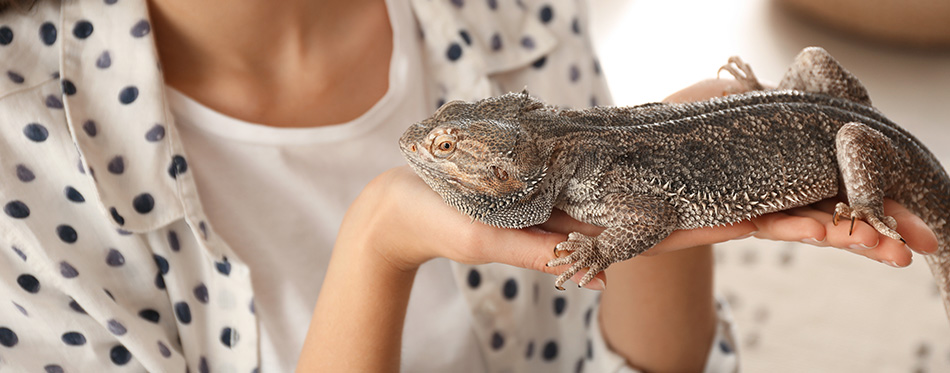
Bearded Dragons may be native to Australia, but they’re perfectly easy to find all over the world in pet stores. You won’t usually find them in your local big pet store, but instead, you should find a reptile specialist store and check there. Alternatively, there are plenty of private sellers for these colorful lizards.
Although they are considered to be one of the more basic exotic pets to have, they have complex feeding requirements and nutritional needs, to say nothing of their environmental needs. Despite this, few animals are as interesting to watch as the Bearded Dragon. They show a range of unique behaviors and enjoy perching on their owner’s shoulders or sitting against their chest in a loose hold.
Basic care needs:
- A large tank, somewhere between 55 and 75 gallons
- Rocks, logs, and other climbable apparatus for their tanks
- They need areas to hide away and somewhere to bask
- Temperature controls
- UV lighting
- Humidity between 35 and 40%
- Proper tank flooring material, such as sand
- A range of food, including insects
Hermit Crab
There are a few reasons that Hermit Crabs didn’t make the low maintenance list and are in this section, instead. One of those is their odor. A pet can’t truly be considered low maintenance when you’re spending time trying to contain its smell, and Hermit Crabs do have a strong scent. When stressed, this little creature releases pheromones that are particularly smelly, so it’s best to only take on these crabs as pets if you have the right environment for them to thrive in.
These crabs have the ability to live on land, using empty shells and other items as their new home. As a Hermit Crab grows in the wild, they’ll often switch to the next biggest shell and then continue on with their life. Although they’re often seen scuttling along alone, Hermit crabs actually love company, so you could have multiple crabs living together without any issues.
This type of pet is better for people who are awake more at night or work from home during later hours because Hermit Crabs are nocturnal and they sleep all day.
Basic care needs:
- Socialization
- Aquarium with a glass cover
- Tropical temperatures
- Aquarium sand rather than water – these are land crabs!
- Humidity of 50 to 70%.
- Bowl for water
- Suitable food
Leopard Gecko
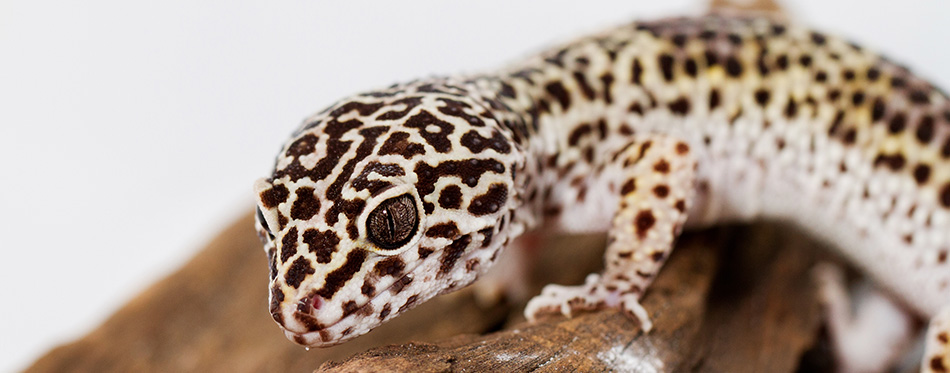
Leopard Geckos are an excellent beginner’s reptile. They’re significantly smaller than Bearded Dragons and require less care than other lizards that are exotic or common pets. These little lizards have really interesting movements, and can be found in a range of colors – though yellow, white, and black spotted Leopard Geckos are the most common ones available.
Your Leopard Gecko can live up to 20 years in captivity and they are very hardy creatures. They won’t get stressed or upset if their tank environment is a bit off, but you should still try to stick to their basic care requirements as closely as possible. Know that these lizards are another nocturnal exotic animal, and they are ground-dwelling in the wild. They can’t climb walls, so there’s no need to buy a bunch of climbing toys or things like that for their tank.
They’re also vocal when they’re hungry, which is great for new pet owners who are getting used to feeding their pets on a schedule.
Basic care needs:
- Socialization
- Decent sized tank
- Only one male per tank, at most
- Low-level climbing apparatus like half logs
- Provide hiding spaces
- Basking spot with a lamp
- Good diet of insects
Low Maintenance Exotic Pets
Our third section of exotic pets is all for low-maintenance pets that you could consider exotic. These pets are quieter, don’t need much space, and aren’t particularly smelly pets – most are actually considered odorless! These are among the best small pets for anyone who hasn’t owned many or any pets before or for people who are new to the world of exotic animals. They mostly need a large cage or indoor enclosure for you to get started!
Chinchilla
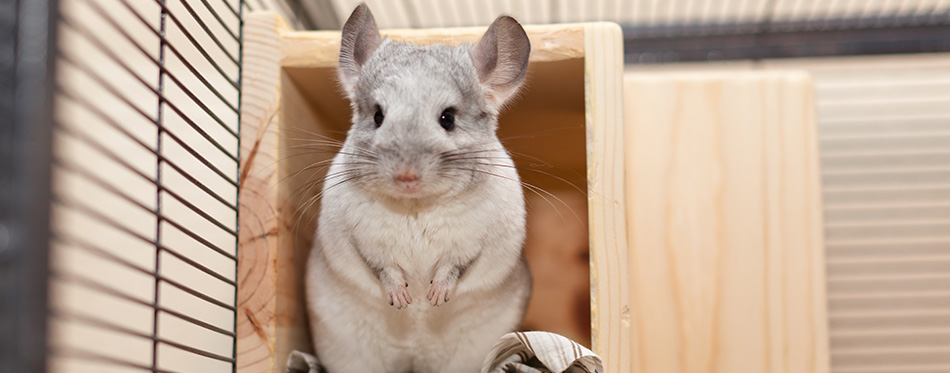
The Chinchilla is a great pet! They’re super cute, can be housed together, and though they’re lively, it isn’t difficult to look after a Chinchilla. Chinchillas are somewhat nervous rodents, so they don’t need much handling or socialization with humans, simply because they won’t enjoy it, and being petted stresses them out. Because of this, the Chinchilla makes a better pet for adults than children and is perfect for people who live busy lives but still want a pet to love and look after.
You should aim to have at least two Chinchillas. They may not care much for human company, but they aren’t solo animals. Littermates are always happy to live together, but be sure to neuter at least one of the sexes so you don’t end up with baby Chinchillas everywhere.
Basic care needs:
- Dust baths
- Good quality grass hay
- Toys to keep them active and busy
- Warm temperatures
- Water bottle
- A second Chinchilla to be housed with
- A cafe that is at least 90cm in length by 120cm in height
Ferret
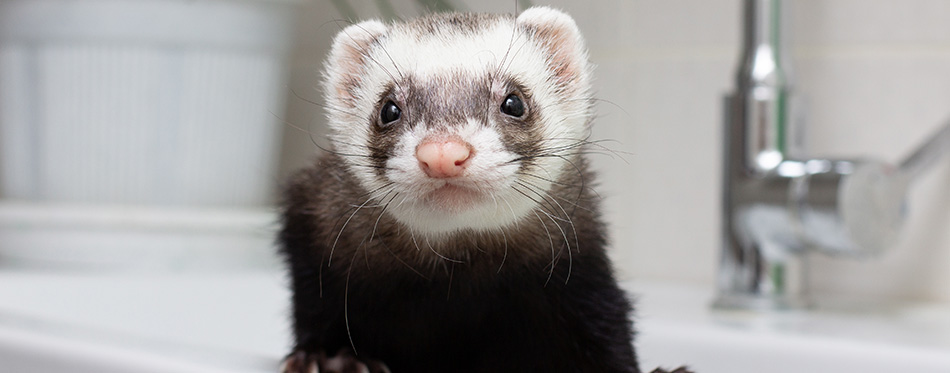
The Ferret, like the Chinchilla, is an incredibly easy exotic animal to look after. You wouldn’t think they count as exotic, but consider how many people you know that own a Ferret, compared to those who own a cat or a dog. You can maybe think of one or two people, right?
Ferrets have been domestic pets for a long time. They’re highly intelligent, sociable, and only require as much care as your standard domestic cat or dog. Their average lifespan is short, with most Ferrets living just 5 to 7 years. They can be curious, and it’s better to house them in pairs so that they don’t get lonely. Your Ferrets may nap up to 20 hours a day, further adding to their low-maintenance status.
Basic care needs:
- Ample playtime
- Another Ferret to be housed with
- Things to crawl through and hide in
- To be neutered, which helps with their smell
- Monthly baths
- Requires meat in their diet
FAQs:
What is the best exotic pet for a beginner?
A Sugar Glider Squirrel is an odor-free animal that will still give your home an exotic look if you really want a special new pet. They make good pets because they’re extremely low maintenance, and these small rodents don’t need much in the way of care. They have loving personalities, though, and with a proper diet and enough socialization, you’ll benefit from an excellent tiny friend.
Where can I buy exotic pets?
Some exotic pets can be purchased from pet stores, but you’re more likely to find exotic animals from organizations that rehome those specific animals or breeders. It’s important to try and rehome animals where possible, or to buy from reputable breeders who are referenced by animal organizations and not backyard breeders selling on marketplaces.

